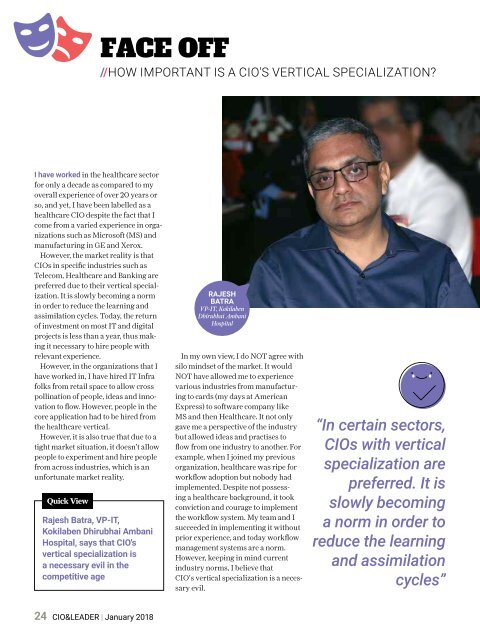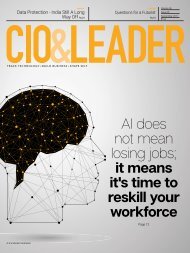CIO & LEADER-Issue-10-January 2018 (1)
The cover story on CIO&Leader's January issue is a dive into the skills that CIOs are going to develop and hire in 2018
The cover story on CIO&Leader's January issue is a dive into the skills that CIOs are going to develop and hire in 2018
Create successful ePaper yourself
Turn your PDF publications into a flip-book with our unique Google optimized e-Paper software.
FACE OFF<br />
//HOW IMPORTANT IS A <strong>CIO</strong>'S VERTICAL SPECIALIZATION?<br />
I have worked in the healthcare sector<br />
for only a decade as compared to my<br />
overall experience of over 20 years or<br />
so, and yet, I have been labelled as a<br />
healthcare <strong>CIO</strong> despite the fact that I<br />
come from a varied experience in organizations<br />
such as Microsoft (MS) and<br />
manufacturing in GE and Xerox.<br />
However, the market reality is that<br />
<strong>CIO</strong>s in specific industries such as<br />
Telecom, Healthcare and Banking are<br />
preferred due to their vertical specialization.<br />
It is slowly becoming a norm<br />
in order to reduce the learning and<br />
assimilation cycles. Today, the return<br />
of investment on most IT and digital<br />
projects is less than a year, thus making<br />
it necessary to hire people with<br />
relevant experience.<br />
However, in the organizations that I<br />
have worked in, I have hired IT Infra<br />
folks from retail space to allow cross<br />
pollination of people, ideas and innovation<br />
to flow. However, people in the<br />
core application had to be hired from<br />
the healthcare vertical.<br />
However, it is also true that due to a<br />
tight market situation, it doesn’t allow<br />
people to experiment and hire people<br />
from across industries, which is an<br />
unfortunate market reality.<br />
Quick View<br />
Rajesh Batra, VP-IT,<br />
Kokilaben Dhirubhai Ambani<br />
Hospital, says that <strong>CIO</strong>'s<br />
vertical specialization is<br />
a necessary evil in the<br />
competitive age<br />
RAJESH<br />
BATRA<br />
VP-IT, Kokilaben<br />
Dhirubhai Ambani<br />
Hospital<br />
In my own view, I do NOT agree with<br />
silo mindset of the market. It would<br />
NOT have allowed me to experience<br />
various industries from manufacturing<br />
to cards (my days at American<br />
Express) to software company like<br />
MS and then Healthcare. It not only<br />
gave me a perspective of the industry<br />
but allowed ideas and practises to<br />
flow from one industry to another. For<br />
ex<strong>amp</strong>le, when I joined my previous<br />
organization, healthcare was ripe for<br />
workflow adoption but nobody had<br />
implemented. Despite not possessing<br />
a healthcare background, it took<br />
conviction and courage to implement<br />
the workflow system. My team and I<br />
succeeded in implementing it without<br />
prior experience, and today workflow<br />
management systems are a norm.<br />
However, keeping in mind current<br />
industry norms, I believe that<br />
<strong>CIO</strong>'s vertical specialization is a necessary<br />
evil.<br />
“In certain sectors,<br />
<strong>CIO</strong>s with vertical<br />
specialization are<br />
preferred. It is<br />
slowly becoming<br />
a norm in order to<br />
reduce the learning<br />
and assimilation<br />
cycles”<br />
24 <strong>CIO</strong>&<strong>LEADER</strong> | <strong>January</strong> <strong>2018</strong>














